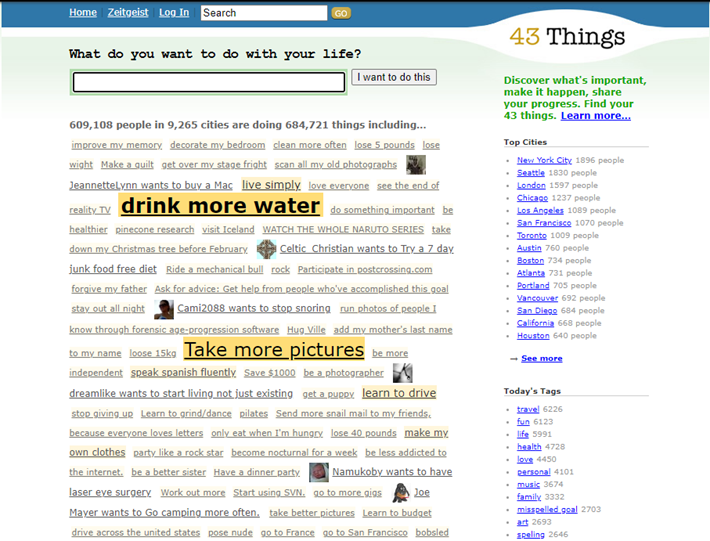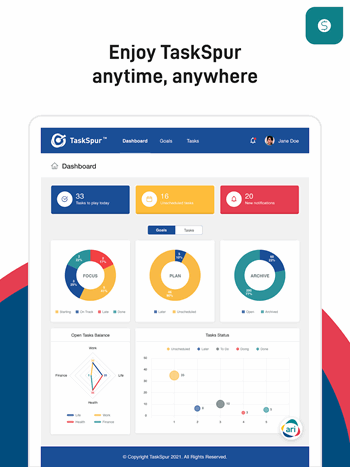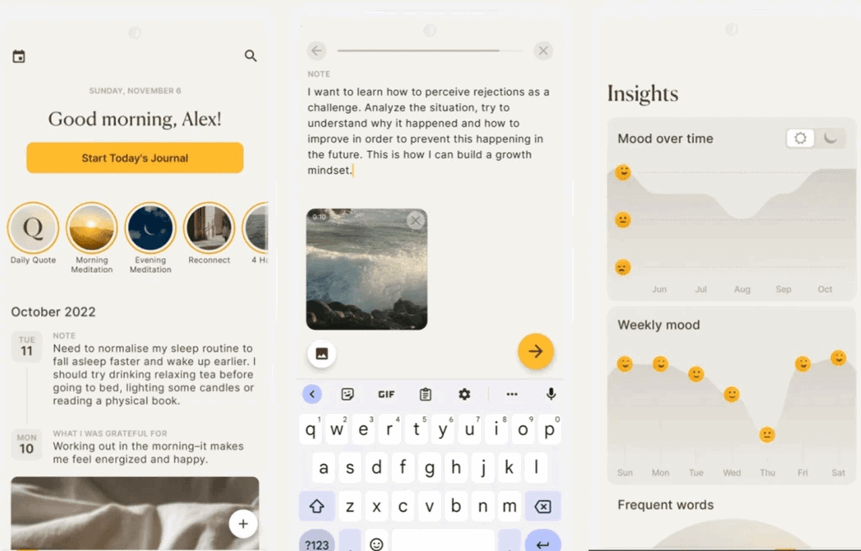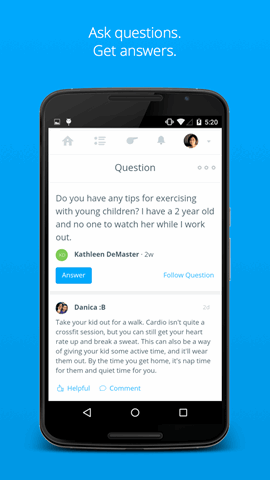The Best Accountability & Goal-Setting Tools to Help You Stick to Your Goals
Many individuals who set personal and professional goals often find it challenging to stick to their commitments. This is where accountability and goal-setting tools come into play. They are useful allies that make being accountable a lot easier. Ranging from apps and software to traditional methods, they provide structured frameworks that keep you committed, disciplined, and on track! In this article, we will delve into the diverse landscape of accountability tools and explore how they empower you to not only set ambitious goals but also triumphantly achieve them. Let’s get going!
Accountability means to say what you do, do what you say. - Pearl Zhu
The Evolution of Goal Setting Tools
The evolution of goal-setting tools has been closely tied to advancements in technology and changes in how people work and manage their personal and professional lives. Here's a brief overview of the key stages in the evolution of goal-setting tools.
Pre-digital era
Before the digital age, people primarily relied on traditional methods such as notebooks, planners, and to-do lists to set and track their goals. This pen-and-paper approach worked well for individuals managing simple tasks and short-term objectives.
Early Digital Tools (around 1980s-1990s)
With the advent of personal computers, individuals started using digital tools like spreadsheets and simple databases to organize and track their goals. The early tools used during that time include the IBM Lotus Organizer, the FranklinCovey Planning Software, the Windows 95 Task Scheduler, and even handheld digital organizers like the Palm Pilot.
Technology-Based Accountability & Goal-Setting Tools
In the 21st century, the internet certainly helped spread the development and use of online platforms dedicated to goal setting. Websites like 43Things and Joe's Goals gained popularity and helped users publicly share their goals and progress with a community.
 The original 43 Things website, image from the Wayback Machine
The original 43 Things website, image from the Wayback Machine
But perhaps the most important change is the rise in the use of smartphones and with them, mobile software applications that offer features like task prioritization, collaboration, social integration, and real-time updates. The current developments in artificial intelligence are also slowly gaining headway in the productivity and goal-setting sphere. More focus is also being geared toward mental well-being.
Habit-Tracking Apps
Habit-tracking apps are mostly used for establishing and maintaining healthy routines. People who use them often do so to either make new habits or break bad ones. Habit-tracking apps are perfect for goals that require repeating actions over a period of time such as adopting a specific fitness routine, meditating, fixing your sleeping schedule, and becoming more focused.
By addressing common difficulties such as forgetfulness and lack of motivation (nobody wants to break a good streak!), these apps help encourage users to be more accountable and consistent with ease.
Productivity vlogger Mike Dee tried out dozens of habit trackers over the years and picked out his favorite from the bunch. Check out these habit trackers and pick the one that works best for you.
Awesome Habits
Awesome Habits is an app that offers a very good user interface and can sync with Apple Health. You can choose to build good habits or break bad ones. It covers the most essential features and works across devices. It also comes with its own widget.
Habit Tracker
This highly-rated habit-tracking app is very customizable. Perhaps (almost) everything you would want in a habit-tracking app you can do using Habit Tracker. For example, you can choose when you want your reminders to pop up. You can also add a start and end date to your habits. There is a timer and white noise feature that allows you to focus, and there are challenges you can join alongside other users.
![]() Image by Ketut Subiyanto on Pexels
Image by Ketut Subiyanto on Pexels
Everyday
If you’re looking for something simple — a no-fuss, no-BS habit-building app, then you have to check out Everyday. All the habits you want to form are presented in a very visual, easy-to-understand user interface in this accountability and goal-setting tool. Not only that, it only takes a click to update. It’s the perfect app for those who want a habit-forming app that does the job and does it very well.
Productive
The Productive habit app has a well-designed user interface that is easy to look at and equally easy to understand. The challenges help keep you motivated along with other users. It also offers detailed analytics and visualization of your progress and ensures you stay on top of your tasks and habits using smart reminders.
Avocation
Unlike other apps, Avocation does not punish you for missing a day in your streak. Instead, this mental health-focused app uses a virtual plant that grows as you keep doing your real-life habits. So if you’re someone who is easily discouraged, Avocation’s clever UI may just be what you need. Your virtual plant becomes the online manifestation of your real-life efforts, providing a visual reminder of your progress and motivating you to keep going.
Habitify
Habitifiy is a habit tracker, accountability, and goal-setting app that offers different types of live challenges that you can join with other people. The app allows you to host your own challenges and invite your friends. This social element of the game is so that the user won’t feel alone as they try to establish good habits for themselves. It keeps the user answerable to their commitments and motivated at the same time.
![]() Habitica app (Image lifted from Uptodown website)
Habitica app (Image lifted from Uptodown website)
Habitica
Habitica is a free app that gamifies the habit-making process using retro RPG elements. As a player (user), you unlock the different features of the game by checking off your real-life tasks. This way, habit forming becomes a much more entertaining and challenging process.
Project Management Tools for Personal Goals
Aside from pure habit-tracking apps which are more focused on developing systems and habits instead of tracking a unified and collective goal, you may also use professional project management tools. These tools allow you to identify a goal and an end date and track your progress along the way.
Here are some of the best project management tools that are perfect for personal goal-setting.
TaskSpur
TaskSpur is a life management app. What it aims to do is make sure everything you do contributes to a bigger goal that will give you self-fulfillment. This app emphasizes four areas of life that you can set your goals for: professional, health, personal, and finance. Its magic is in its simplicity. You set up a goal under one of the primary categories above, create tasks under that goal, and track your progress until it’s completed.

Trello
Trello is a popular app that uses boards, lists, and cards to organize and prioritize your projects. Like TaskSpur, its default view is Kanban, allowing you to see the tasks under your To Do, Doing, and Done. You can create boards for different aspects of your life and cards to represent the tasks under them.
Asana
This versatile project management tool works well for both team and personal projects. It allows you to create tasks, set due dates, and organize them into projects. Asana also has a calendar view so you can easily see the timeline of your projects.
Notion
Notion has something for everything. A truly versatile platform, it combines note-taking, collaboration, task management, and goal management under one roof. With Notion, you can create databases, tables, and boards to organize your personal goals and projects. This flexibility makes it suitable for different use cases and an effective tool for keeping yourself accountable as you make progress toward your goals.
Journaling and Reflection Tools
Goals are well and all. But sometimes, jotting them down isn’t enough. That’s where journaling and reflection tools come in. They help you take a step back and really “think” about what you want in life. By writing things down and asking yourself questions, you can figure out what you really want out of it and why, allowing you to see your path more clearly.

Engaging in just 5 to 10 minutes of reflection every day can make an incredible difference in your mental clarity. Of course, context matters too! Reflection is especially necessary after significant events, challenging situations, and during a learning phase. Reflection will help you thoroughly absorb the lessons of the experience and make adjustments. But most of all, it helps you understand yourself and properly regulate your emotions which is an essential part of becoming the person who is accountable to their goals and commitments.
That being said, the following tools will be useful in making reflection an easier and more enjoyable task.
Simple journaling & reflection apps
If you want a tool that focuses on writing, try the multi-platform diary app Diaro. If you are looking for something that is still minimalistic but with an added focus on privacy, try Day One. For a simple reflection app that is known for its password protection and encryption features, look at Penzu.
Guided journaling & reflection apps
If you want a journaling app with a bit more finesse, you might enjoy using guided and prompted journaling apps. The Five Minute Journal uses positive psychology principles, with prompts for gratitude and affirmations to nurture your mental well-being. Reflectly uses AI to provide daily mood check-ins and personalized reflection prompts. And if you want daily inspiration and regular challenges, you can look to Journey to keep you motivated on a daily basis.

The Five-Minute Journal App (Image from the Tool Finder)
Creative and multimedia journaling & reflection apps
These apps offer an unconventional approach to reflection. For example, Daylio tracks your moods and allows you to express yourself using only emojis and icons without any writing required. Momento captures memories using photos, videos, and notes in a timeline format. And if you want a journaling app where you can do basically everything then Notion again saves the day.
Social Accountability Platforms
Social accountability tools put the fun in goal-setting! These tools add a social element to achieving the big things in life so that you won’t feel alone in chasing after the things you want. These online communities act like virtual support groups, where you can share your aspirations and track your progress with others. Think of it as a gym buddy for your life goals! They're ideal for anyone who thrives on friendly encouragement and a little friendly pressure, especially those tackling personal goals like fitness, learning a new skill, or breaking bad habits.
The following are reliable social accountability platforms worth checking.
Coach.me
Imagine having an expert to guide you with your goals! Coach.me uses personalized goal coaching and accountability partnerships to help people finish what they set out to do. Its features include getting matched with a certified coach who will guide you toward your goals, set milestones, and track progress, give regular check-ins and personalized feedback, and join goal groups for peer support and encouragement.
 Coach.me app (image from Play Store)
Coach.me app (image from Play Store)
StickK
If you want to raise the stakes, StickK is the social accountability platform for you. You set a goal, choose a commitment contract, stake money on your success, and then designate a referee to hold you accountable. If you fail, you lose the staked money but if you succeed, you donate the money to a charity of your choice. Adding this financial element to goal-setting makes it ideal for those who need a stronger and more impactful external motivator.
Wearable Technology for Goal Tracking
Wearable technology isn't just about counting steps anymore. It's about understanding your body, mapping your progress, and even nudging you towards your goals in real-time. These days, there are gadgets for gathering data about your sleep patterns and heart rate, the number of steps you take daily, and how many calories you burn. This richer information makes goal-setting smarter, letting you tailor your targets to your individual needs and adjust them based on your body's unique feedback. Wearable tech is a game-changer for those who are serious about their health goals — as everyone should be!
Gamification in Goal Achievement
The most common problem when it comes to staying true to one’s commitments is how easy it is to just say No to it at the moment. This is where gamification comes in. Gamification is, essentially, a clever manipulation of human psychology and brain chemistry. Here are some key reasons why it works.
 Image by Uriel Mont on Pexels
Image by Uriel Mont on Pexels
- It produces a dopamine rush. Completing tasks, earning points, or achieving levels triggers the release of a neurotransmitter called dopamine which is associated with pleasure and reward. This positive reinforcement encourages further participation in whatever it was that triggered the dopamine rush in the first place.
- It gives one a sense of progress. Gamification provides clear checkpoints and progress tracking which then gives you a tangible sense of having accomplished something and ultimately motivates you to keep doing what you’re doing.
- It is competitive. Leaderboards and collaborative elements tap into humans’ natural competitive spirit and desire for social recognition which fuels motivation.
Overall, gamification is effective because it harnesses an inherent desire for reward, progress, and social connection, making tasks that are otherwise tedious more enjoyable and motivating.
Integrating Accountability Tools into Daily Life
Accountability tools, old and new alike, are fantastic for getting you where you want to be in the future. If you’re thinking about integrating an accountability tool or two into your goal-setting arsenal, the following tips will help you start with the right foot forward.
Choosing the right accountability tools
- Use the right tool for the right goal. Different goals can benefit from different tools. Habit trackers work well for building or breaking routines, while project management apps excel at tackling larger projects. Consider your goal's needs before choosing a tool.
- Start with a simple tool. Don't overwhelm yourself with a complex system. Begin with a basic tool that's easy to learn and use it consistently. You can always upgrade later as you get comfortable.
- Free vs Paid. Some goals can be done with free apps but if you’re looking for something beyond the basics, then you might benefit from some tools’ paid offers.
 Image by Andrea Piacquadio on Pexels
Image by Andrea Piacquadio on Pexels
Making the most of accountability and goal-setting tools
- Set SMART goals. As Zig Ziglar said, a goal properly set is halfway reached. Set your goals properly from the get-go. Click here to learn how to turn regular goals into SMART goals..
- Break down goals into smaller tasks. Large goals can feel intimidating. This often causes people to back out and end up failing before they even begin. So break it down and work your way forward step by step.
- Schedule regular check-ins. Review your progress regularly, either on your own or with an accountability partner to evaluate if you should keep doing what you’re doing or adjust accordingly.
- Visualize a victory. Never underestimate the power of your brain to create reality. Visualizing success gives your brain positive reinforcement and constant motivation to keep you in action and on the right track.
- Reward yourself. Celebrate your milestones. Don't forget to acknowledge your achievements, big or small. And if possible, with actual concrete gifts that you can look forward to and enjoy.
Download TaskSpur on Android | Download TaskSpur on your iPhone
Sign up or Login on your browser
References
- Schade, R. (2023, August 13). Rubenerd: Memories of Lotus Organizer. © Ruben Schade Unless Otherwise Stated. https://rubenerd.com/memories-of-lotus-organizer/
- Palm Pilot | computer. (n.d.). Encyclopedia Britannica. https://www.britannica.com/technology/Palm-Pilot
- Ccxp, H. G. (2018, September 12). My current planning system. https://www.linkedin.com/pulse/my-current-planning-system-heather-gillbanks/
- Obtaining task scheduler for Windows 95. (n.d.). https://hesperia.gsfc.nasa.gov/hessi/solar_install/Install_scheduler.html
- 43 Things. (n.d.). WaybackMachine. Retrieved January 23, 2024, from https://web.archive.org/web/20060926042835/http://www.43things.com/
- Joe’s Goals. (n.d.). Joe’s Goals. Retrieved January 23, 2024, from https://www.joesgoals.com/
- Mike Dee. (2024, January 2). I Tested 7 Habit Tracker Apps for 2024 (so you don’t have to!) [Video]. YouTube. https://www.youtube.com/watch?v=dlysHPeH3Ck